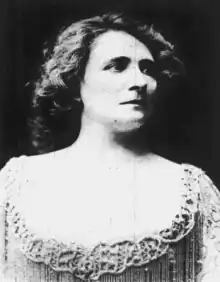Florence Ashbrooke | |
|---|---|
 Florence Ashbrooke, from a 1904 newspaper | |
| Born | 1860s sources vary, possibly India or England |
| Died | February 20, 1934 Los Angeles, California. U.S. |
| Other names | Eleanor Skyrock, Eleanor Shyrock, Eleanor Lugannagh |
| Occupation | Actress |
| Spouse | Tote Du Crow |
Florence Ashbrooke (about 1861 – February 20, 1934) was an actress on the London and New York stages, and in silent films.
Early life and education
Ashbrooke was born to British parents in India or the East Indies,[1] or in England,[2] and educated in Dublin.[3]
Career
Ashbrooke began her acting career in England.[4] She was a dancer with the Gaiety Company in London as a young woman.[3] She acted on the New York stage and toured in plays in North America, with credits in The Twelve Temptations (1889),[5] The Ice King (1890),[6] McKenna's Flirtation (1892),[7][8] Dolly Varden (1893),[9] Blue Grass (1894),[10] When London Sleeps (1896),[10] An Irish Gentleman (1897),[10] A Young Wife (1900),[11][12] Why Women Sin (1903),[13] Her Mad Marriage (1904),[14] and At the Old Cross Roads (1908).[15] The Omaha Bee described Ashbrooke in 1890, as "a much stronger woman than you usually see in farces" with a "handsome figure, a well modulated voice, and an art which shows a most excellent school."[16]
Ashbrooke appeared in dozens of silent films between 1911 and 1923, including an adaptation of Vanity Fair (1911), The First Woman Jury in America (1912), The Cross Roads (1912), The Forgotten Latchkey (1913), The Ragged Princess (1916), On Dangerous Ground (1917), The Scarlet Letter (1917),[17][18] The Lone Wolf (1917),[19] Peggy, the Will O' the Wisp (1917), Blue-Eyed Mary (1918),[17] Swat the Spy (1918),[17] The Woman on the Index (1919), An Amateur Widow (1919),[20] A Stage Romance (1922), and Big Brother (1923).[21] She was a member of the Motion Picture section of the Actors' Equity Association in 1921.[22]
Personal life
Ashbrooke described herself as a widow when she married actor and circus clown Tote Du Crow in 1889;[2][23] they separated in 1904, and divorced in 1909.[24][25] She died in 1934, in Los Angeles, probably in her seventies.[26]
References
- ↑ In the 1930 United States federal census (via Ancestry), Florence Ashbrooke listed her birthplace as "East Indies" and both her parents' birthplaces as England. She also described herself as a naturalized American citizen, an actress, age 60, and widowed, living as a roomer in Los Angeles. In the 1925 New York state census (via Ancestry), Florence Ashbrooke described herself as 55, 35 years in the United States, and born in "Umbalo", which may mean Ambala, India (the city was called "Umballa" by Kipling, among other Anglophone versions of the name).
- 1 2 When she married George T. Ducrow in 1889, she gave the name Eleanor Lugannagh, and said that she was married once before and a widow; also that she was born April 13, 1864, in England. Pennsylvania U. S. Marriages, Allegheny County, 1889, via Ancestry.
- 1 2 "What They Were Before They Became What They Are". The Photo-Play Journal: 24. July 1917 – via Internet Archive.
- ↑ "FLorence Ashbrooke". The National Police Gazette. 53 (581): 14. 1888-11-03 – via Internet Archive.
- ↑ "Star Theatre: The Twelve Temptations". The Amusement Bulletin. 1 (12): 19. December 21, 1889.
- ↑ "Dramatic Notes". St. Louis Post-Dispatch. 1890-06-15. p. 14. Retrieved 2023-11-07 – via Newspapers.com.
- ↑ "For Play Goers". The Brooklyn Citizen. 1892-01-31. p. 6. Retrieved 2023-11-07 – via Newspapers.com.
- ↑ "Stage News". Fall River Globe. 1890-09-11. p. 2. Retrieved 2023-11-07 – via Newspapers.com.
- ↑ "Patti Rosa; The Attraction at the Opera House for Thursday Evening". Chippewa Herald-Telegram. 1893-03-21. p. 3. Retrieved 2023-11-07 – via Newspapers.com.
- 1 2 3 Brown, Thomas Allston (1903). A History of the New York Stage from the First Performance in 1732 to 1901. Dodd, Mead. pp. 183, 511, 512.
- ↑ "'A Young Wife' Coming Soon". Portland Sunday Telegram. 1900-05-13. p. 7. Retrieved 2023-11-07 – via Newspapers.com.
- ↑ "Amusements". The Halifax Herald. 1900-05-23. p. 6. Retrieved 2023-11-07 – via Newspapers.com.
- ↑ "An Interesting Budget of General Theatrical News". Courier-Post. 1903-09-25. p. 4. Retrieved 2023-11-07 – via Newspapers.com.
- ↑ "Amusements of the Week". The New York Times. September 25, 1904. p. 31. Retrieved 2023-11-07.
- ↑ "Music and Drama". The Indianapolis Star. 1908-04-07. p. 10. Retrieved 2023-11-07 – via Newspapers.com.
- ↑ "Stage Notes". The Sacramento Union. 1890-11-02. p. 1. Retrieved 2023-11-07 – via Newspapers.com.
- 1 2 3 Solomon, Aubrey (2014-01-10). The Fox Film Corporation, 1915-1935: A History and Filmography. McFarland. pp. 238, 247, 250. ISBN 978-0-7864-8610-6.
- ↑ "Crandall's--'The Scarlet Letter'". The Washington Post. 1917-02-13. p. 9. Retrieved 2023-11-07 – via Newspapers.com.
- ↑ "'The Lone Wolf,' Vance's Film, at Broadway Tuesday". The Sunday Record. 1918-08-18. p. 18. Retrieved 2023-11-07 – via Newspapers.com.
- ↑ "'An Amateur Widow'". The Moving Picture World. 40 (8): 1227. May 24, 1919 – via Internet Archive.
- ↑ "Big Brother Finished". News-Journal. 1923-10-30. p. 13. Retrieved 2023-11-07 – via Newspapers.com.
- ↑ "Actors' Equity Association News". Billboard. Vol. 33, no. 5. 1921-01-29. p. 21 – via Internet Archive.
- ↑ "Dramatic and Musical Notes". New York Clipper. April 27, 1889. p. 106. Retrieved November 7, 2023 – via Illinois Digital Newspaper Collections.
- ↑ "Clown Seeks Divorce". San Francisco Call. August 21, 1909. p. 20. Retrieved November 7, 2023 – via California Digital Newspaper Collection.
- ↑ "Gets Divorce When Hubby Turns Clown; Actress Could Not Stand Mate Who Left the Legitimate for Circus". The San Francisco Examiner. 1910-01-05. p. 9. Retrieved 2023-11-08 – via Newspapers.com.
- ↑ "Florence Ashbrooke (funeral notice)". The Los Angeles Times. 1934-02-23. p. 20. Retrieved 2023-11-07 – via Newspapers.com.
External links
- Florence Ashbrooke at IMDb
- Portrait of Florence Ashbrooke from about 1888, and a full-length photo, both by Max Platz, in the collection of the University of Louisville Libraries